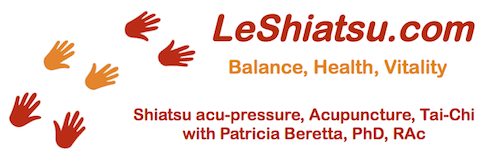Shiatsu was developed at the beginning of the twentieth century in Japan. It grew from traditional massage and energy-based therapies imported from China several centuries earlier as well as from modern advancements in physiology and medicine.
The Japanese word "shi-atsu" means "finger pressure". The Japanese character for Shiatsu can be seen in our logo.
Shiatsu is a gentle type of massage done through clothing. Pressure is applied along the Qi meridians with thumbs, palm, elbow or even sometimes a knee. The sustained vertical pressure of Shiatsu provides a deep tissue massage and stimulates acu-points. Pressure and gentle stretches increase flexibility, release tensions, and promote free flow of Chi.
Shiatsu uses the same Qi meridians as acupuncture except that the stimulation is manual. A Shiatsu health assessment is similar to that of acupuncture (discussion of symptoms, observation, pulse, tongue), with the addition of palpating Shiatsu-specific reflexes on the body. For musculo-skeletal disorders, physiotherapy type of tests are also performed.
Shiatsu treats similar issues as acupuncture. Shiatsu is a unique physical therapy intended to encourage our innate ability to heal ourselves.
Shiatsu is very effective for musculo-skeletal disorders. I often see people who have been in pain for years to decades due to an old sport injury, a whiplash accident, and persistent back pain, as well as chronic pain / fatigue of unexplained origin. A Shiatsu therapist receives a thorough training in anatomy and can evaluate which structures are involved. In addition, working with the Chi meridian system allows for treatment of distal areas connected with the pain and provides a deeper and more effective treatment. Because Shiatsu also leverages the whole system of Qi meridians from TCM, it can help address a large variety of internal issues such as anxiety, stress, insomnia, digestive disorders, gynecological issues, dizziness/vertigo etc.
Your experienced Shiatsu therapist has developed an extreme sensitivity with her hands and feels through clothing where issues are on the body. Sometimes theories are not enough. We seem to understand what is happening with anatomical structure, and we seem to identify the root cause of Qi imbalance but something is still missing and a significant detail seems hidden. The direct connection from touch and hands provides an additional valuable piece of information. It is a form of communication between the therapist and the patient that is difficult to describe with words. It provides an additional mechanism to get to the heart of some issues. Oftentimes I realize that my hands have been working on a specific area for quite some time, and am told by the receiver that this is exactly where it hurts or where the issue seems to be coming from. Shiatsu masters speak of “mother’s touch”, an intuitive way to bring comfort that we all possess. As the therapist manually touches a body part, she can "diagnose" what is happening based on the palpatory sensation of the energy reflex she is touching. As touch is applied to an area, tensions and weaknesses get rebalanced. This is why Shiatsu masters say: "with Shiatsu, diagnosis is treatment, and treatment is diagnosis". There is a constant dual act between listening with the hands, and treating with them.

